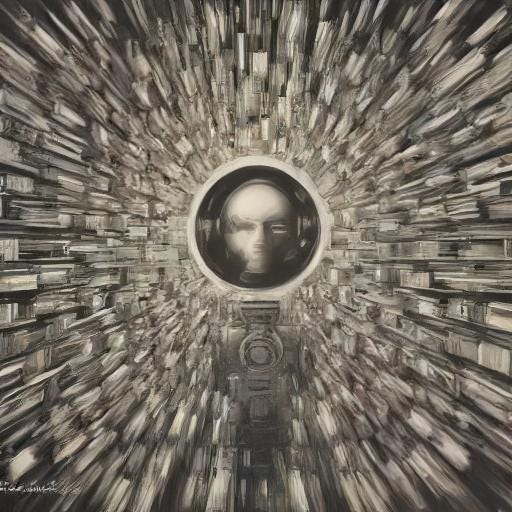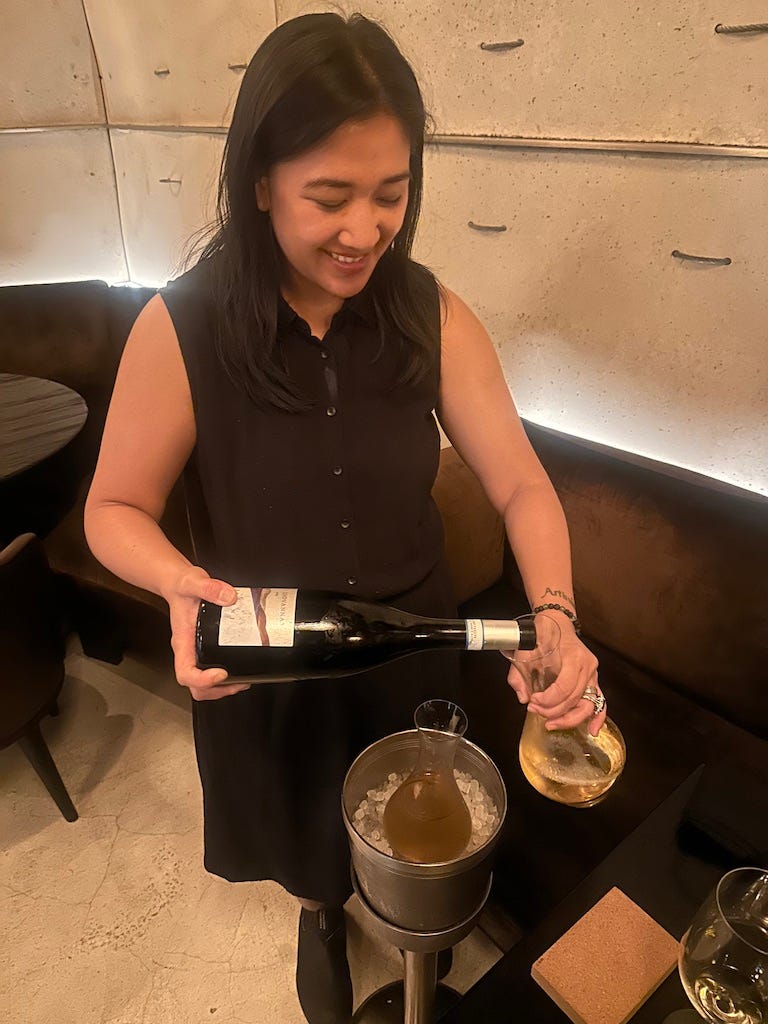Glass Half Empty or Half Full: My Mental Health in the Wine World
A few years ago, I wrote about my experience of living and treatment with anxiety and depression while working in restaurants. This is the sequel. Cheers to keeping me accountable.
My name is still Jordanne (but now my last name is Pascual-Cancel because I got married). I still have anxiety and depression.
I won’t go into too much detail about what has happened since I wrote about my mental health in 2021, where I discussed accepting I have anxiety and depression and how I cope with it working in hospitality. Since that post, I have worked on mindfulness, boundaries, and positive self-talk. But in the past nine months, the monkey in my brain scratched thoughts that range from doubt, discouragement, and existential dread. Depending on the day, sometimes the thoughts overlap in a Venn diagram or magnified or magnified and in a Venn diagram like so:

You’re probably thinking, “Jordanne, you work in restaurants and hospitality; none of these thoughts align with your career.” You might also be thinking, “Jordanne, don’t you know wine is alcohol and alcohol is a depressant that negatively affects physical and mental health? Why do you choose to work with it? Maybe you put this on yourself.” You’re probably right.
So, is this a whiney, self-pitying post from your typical millennial? Is this a rant on the world? Is Jordanne pulling a Harry and Meghan? Only if you read it that way.
This is an honest post about how I work with wine while living with anxiety and depression. This is a vehicle to inspire more people to talk about and normalize mental health. This is a reminder that the person sharing their wine wins on social media, serving you food and drink, and spitting facts may be quietly suffering and too busy and/or ashamed to reach out for help.
Establishing My Relationship with Wine
My relationship with wine evolved over the years. In college and grad school, wine symbolized sophisticated drinking when hanging out with friends. In my publishing career, wine relieved stress like how Olivia Pope drank a huge glass of Bordeaux after fixing things in Scandal. In my career transition, wine became the ultimate condiment for my meals.
Now, wine is a meditative reprieve to help me refocus on the present and relieve some stress while expanding my knowledge.
When in the middle of a busy dinner service with staff offloading their problems and guests wanting attention, I have ping-ponging thoughts in my brain, and sometimes feel like I want to cry, tasting a bottle of wine before serving it to guests is a pivotal moment for me to return to the present. If I rush through tasting that bottle, I risk serving a faulty wine or a wine I may have mis-sold. More importantly, I can slow down and take in all of the aromas and flavors the wine presents at that moment. That moment of tasting wine, even if it’s just one minute, re-centers me and takes my mind off the noise and ping-ponging thoughts in my brain.
Studying wine is also a nice break from the chaos of personal errands, projects, events, and fatigue outside the restaurant walls. I know that studying as a form of stress relief seems counterintuitive. However, learning and doing homework was a nice distraction from familial drama and escape when I didn’t want to do family parties. So why change a method that helps me maintain my sanity? Learning about wine not only expands my knowledge base to help others but also allows me to reset from all the energy I absorb from people. I can focus on myself–which is important for maintaining my mental health.
Remembering I’m Always Evolving Just Like a Bottle of Wine
You hear sommeliers, wine writers, and wine aficionados talk about wine as if they were people with specific personalities. They’ll tell you a “young” wine is “tight (especially with a red)” with “ripe fruit aromas and flavors” and “searing acidity”. They’ll tell you a “developed” or “older” wine has “more finesse”, “supple, well-integrated tannins”, and “earthy fruit aromas and flavors but a nice balanced acidity”. Whenever they do a retrospective of a certain producer or a producer’s label, they describe how good a wine is when opened right after bottling, then “quiet” when opened a few years later, and then “finally showing its potential” when opened a few years after that before being “tired”.
The beloved simile of aging like fine wine applies to life professionally and personally. I believe the evolution of my career is the retrospective reflection of a bottle of wine while the evolution of me as a person is the “young” versus “old” notes of a specific bottle of wine. All of this is mentally and emotionally exhausting as if rays of light were coming at me all at once. It can look like this:
That’s when I want the world to stop. And I do stop. I stop to watch a mindless movie, binge eat, and/or cry. I stop to take the medications I’m on that I hope will be a net for the ping-pong balls of thoughts. I stop to refocus (or even reestablish) the endgame. Stopping is a good way to remember my relationship with wine and that everything in my life does get better with time–just like a good bottle of wine.
Accepting Who I Am Through Wine
Wine can be used as a tool for an epiphany. Look at what happened to Dom Pérignon (#IYKYK). The more I work with and drink wine, the more I understand, know, and accept myself–growing up, relationships, and behaviors.
I think about these almost every day:
Is it possible to work in wine but not like being around people because they generally drain my energy?
Did I choose a career in wine and restaurants because I had nothing better to do with my life? Am I not good at other things?
How did I—and still do—deal with the typical neurotic thoughts of “I’m not good enough”, “why can’t I be like a certain person or people”, and “why do I exist” that developed growing up?
Here are the answers I have come up with so far, especially after a good shift, an accomplishment, talking with my therapist, or much-deserved alone time that includes a glass or two of wine:
While people in general suck, my people are great. My people are guests who are interested in wine in general. My people are guests who I’ve gotten to know personally because I took the time to listen to what wine/wine experience they wanted. My people are guests who aren’t pretentious about wine. I choose to give my energy to my people because they energize and motivate me.
I chose a career in wine because wine allows me to tap into all of the unique qualities I developed growing up–yearning for more general knowledge and facts, connecting with small groups of people because I’m introverted, and exercising a creative part of my life that’s not the “norm”. Restaurants are just one way for me to do that. I am good at other things such as writing (duh) and mentally preparing for shit shows (professional and personal). My career in wine is in restaurants now, but like I said earlier, I am always evolving so my career will imminently evolve out of restaurants.
There is always “a way out” of those neurotic thoughts. My ways include prayer, developing relationships with people outside of my family (some of whom were very loud, gossipy, overly affectionate to the point of touchy-feely as well as a parent who reminded me of Joan Crawford due to their unnecessary competitiveness, tendency to gaslight, and unhealthy romantic relationships), and working on work tasks/study projects that I feel will make me a more knowledgeable person.
My work ethic and determination for knowledge prove I’m good enough. The rewards of awards and mentions are simply gravy.
I have recently embraced what makes me different:
My need to hyper-research random facts (wine facts, historical facts, and entertainment industry facts are the main ones).
I’m not the most affectionate person. I think this comes from a loud, large, extended Filipino family with some toxic tendencies as mentioned in some OneDown Media content and close family members telling me I’m cold-hearted. I do have different ways of responding with affection. Those ways vary based on my comfort levels with specific people from a nod, a compliment, a handshake, or a hug.
While I experience FOMO with wine bottles and wine events blasted on social media, I take moments to realize the uniqueness of the bottles I sell and events I do get to be part of. The uniqueness of those bottles and events aligns with my overall wine philosophy that wine is about discovery, creativity, and conviviality and not competition and elitism.
Quite frankly, I still don’t know why I exist. I just do things. I just drink things. I just know things. I just share things. God only knows.
My work in and passion for wine and my mental health have been interesting to observe over the past three years. Seeing how much I’ve grown in living with anxiety and depression and the progress of my career has given me great pride and great fear. I only pray that I continue to manage my expectations of myself and how I handle my mental health as I connect people with their new favorite bottle of wine.







Thanks for sharing. I hope it helped you to express all of this and I am sure it will help others reading this.
I’m so proud of you for having the courage to write about hard topics like mental health. Amazing article!